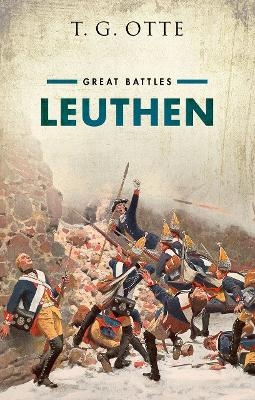
Leuthen
Oxford University Press (Verlag)
978-0-19-287049-0 (ISBN)
Leuthen (1757) is one of the best-known battles of the Seven Years' War, the most consequential conflict in continental Europe between the Thirty Years' War and the wars of Revolutionary and then Napoleonic France. It was a victory against the odds, over a vastly superior Austrian enemy who held the initiative in the war. Leuthen confirmed the reputation of Frederick II ('the Great') of Prussia as one of history's greatest military commanders. His victory rested on superior drill and firepower, intelligent use of the terrain, and his perfecting of the 'oblique battle order'. But faulty intelligence and flawed decision-making on the Austrian side were no less important, as T.G. Otte shows in this reappraisal of events.
Leuthen was of profound significance for the war and for the future course of European history. Frederick's victory reversed the military dynamic of the current conflict. It kept Prussia in the war, preserved the existence of the Prussian state, and laid the foundations of its further rise with consequences beyond Frederick's own times. It also ensured Britain's final commitment to what was becoming a global conflict.
The significance of Prussia's victory extended beyond the military sphere. The 'Leuthen myth', encapsulated in the evocative image of Frederick's exhausted grenadiers intoning the church hymn 'Now thank ye all our Lord', shaped political and historical disputes in nineteenth- and twentieth-century Germany. It also influenced the intellectual assumptions that underpinned Prusso-German war planning before the First World War. The 'Chorale of Leuthen' provided the accompanying chords of German cultural developments up to the collapse of the Third Reich in the burning ruins of Berlin. But even to the present day its echo can still be heard. As with other great battles, Leuthen is constantly reassessed and rewritten as an element of national culture and identity.
T. G. Otte is currently a Professor of Diplomatic History at University of East Anglia. His research examines the history of great power relations from 1600 to the late 20th century. Otte has written or edited twenty two books, including Statesman of Europe: A Life of Sir Edward Grey (London: Allen Lane, 2020) (New Statesman Book of the Year 2020; Spectator Book of the Year 2021), July Crisis: How the World Descended into War, Summer 1914 (Cambridge: Cambridge University Press, 2014) (PROSE Merit award 2015, 'European & World History'), and The China Question: Great Power Rivalry and British Isolation, 1894-1905 (Oxford: Oxford University Press, 2007).
Preface
1: War in the Holy Roman Empire
2: The Silesian Wars
3: The Battle and Its Consequence
4: The Leuthen Legacy in Military Thought before the First World War
5: Myth and Memory: Leuthen's Political and Cultural Legacy
Conclusion
| Erscheinungsdatum | 15.10.2024 |
|---|---|
| Reihe/Serie | Great Battles |
| Zusatzinfo | 40 images |
| Verlagsort | Oxford |
| Sprache | englisch |
| Maße | 145 x 222 mm |
| Gewicht | 510 g |
| Themenwelt | Geschichte ► Teilgebiete der Geschichte ► Militärgeschichte |
| Geschichte ► Teilgebiete der Geschichte ► Wirtschaftsgeschichte | |
| Sozialwissenschaften ► Politik / Verwaltung | |
| ISBN-10 | 0-19-287049-1 / 0192870491 |
| ISBN-13 | 978-0-19-287049-0 / 9780192870490 |
| Zustand | Neuware |
| Haben Sie eine Frage zum Produkt? |
aus dem Bereich


